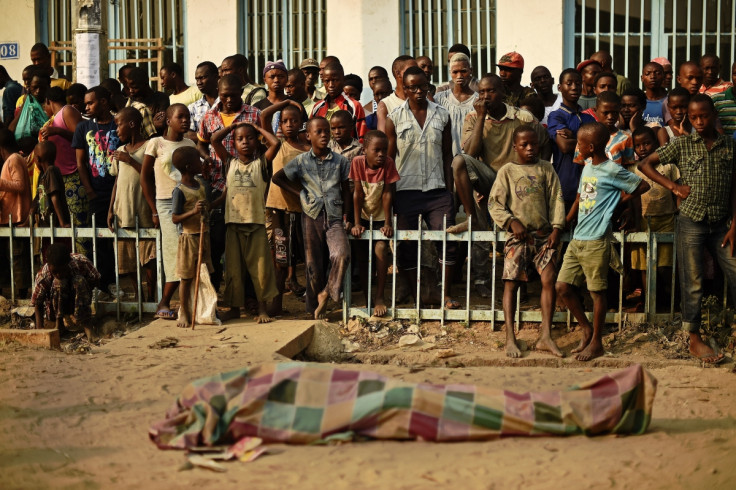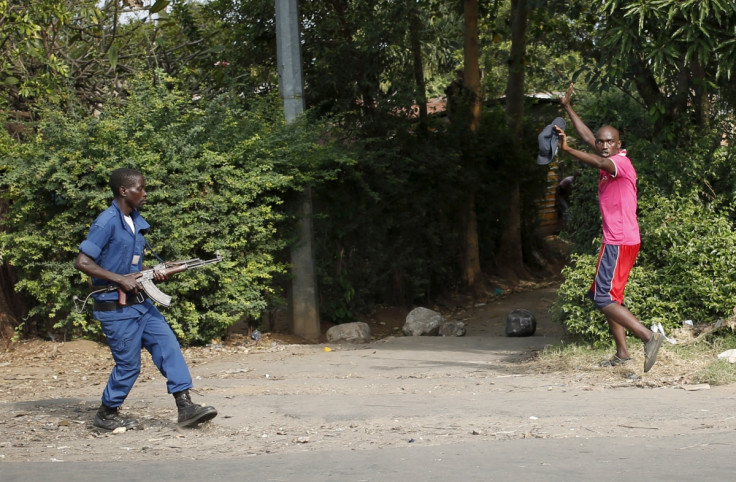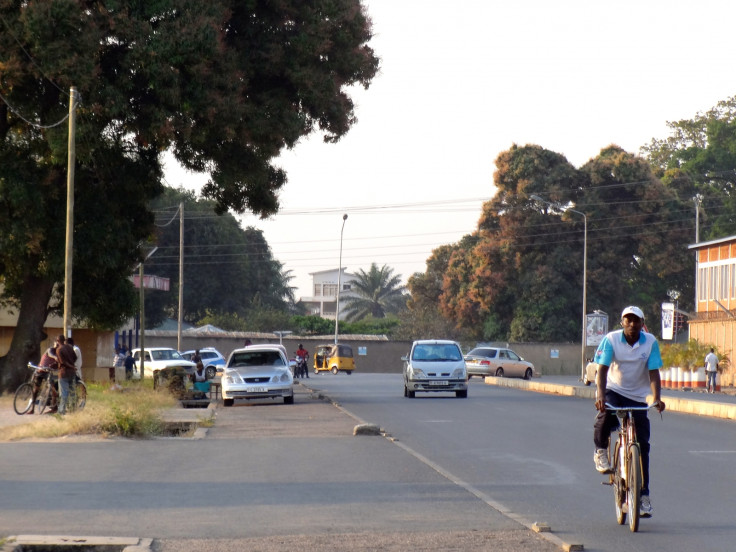Burundi: Opposition lauds Security Council resolution but wants 'criminals' brought to ICC

Despite welcoming the United Nation (UN) Security Council's resolution, Burundi's opposition has called for the UN to recommend all individuals involved in "mass crimes committed against innocent civilians" be trialled by the International Criminal Court (ICC). The vote on Thursday (12 November) followed calls by international leaders for renewed negotiations between Burundi's government and members of the opposition amid fears the country could continue sliding into a Rwandan-style genocide.
UN officials and human rights groups have urged action against what witnesses call a deadly government crackdown on opposition members, after at least 240 people were killed since President Pierre Nkurunziza launched a controversial bid to prolong his term in office in April.
Burundi reso has: threat of sanctions; asks Ban to report on violations, including hate speech, and to make plans to beef-up UN presence
— Philippe Bolopion (@Bolopion) November 12, 2015No reference to the International Criminal Court
The Council for the Observance of the Constitution, Human Rights and the Arusha Peace Accord (CNARED), an alliance-in-exile of several opposition movements, welcomed the UNSC's adoption of a resolution, but said it was still too "minimal".
"The CNARED would have liked for the Security Council to go further by making reference to the ICC for all these mass crimes committed against innocent civilians, as well as impose sanctions specifically targeted against the authors of the mass crimes that have been perpetrated in Burundi for the past six months," the coalition's spokesman Jeremie Minani exclusively told IBTimes UK.
The CNARED would have liked for the Security Council to go further by making reference to the ICC for all these mass crimes committed against innocent civilians, as well as impose sanctions specifically targeted against the authors of the mass crimes that have been perpetrated in Burundi for the past six months.
The ICC has the jurisdiction to prosecute individuals for the international crimes of genocide, crimes against humanity and war crimes.
"These resolutions are welcome but they cannot prevent a catastrophe to occur again," Minani added.
"Twenty one years ago, the international community as a whole was continuing to condemn the brutality of the Interahamwe (Hutu militia groups linked to the genocide) in Rwanda, but in less than three months and while more condemnations were falling, more than 800,000 civilians were exterminated.
"Thus, we want the Security Council to end its silence, take its responsibilities in confronting this criminal machine that grows every day."
Inter-Burundian or international dialogue?
The coalition also lauded the Council's call for an immediate dialogue under the aegis of the international mediation, which Minani claimed excludes the national dialogue put in place by the de facto regime in Bujumbura.
In July, Uganda's President Yoweri Museveni started mediation talks between Burundi's government and opposition groups as mandated by the East African Community.
The government is favourable to an Inter-Burundi dialogue, but is vehemently opposed to holding the talks outside the country, saying the idea of holding talks in the Ugandan capital, Kampala has been driven by Belgium, the former colonial power.

Following the Security Council's unanimous approval of the resolution, the Presidency published a statement, declaring it was "neither down to UN or the European Union, and even less down to the African Union to decide on the behalf of the Burundians".
The Burundian Ambassador to France, Dieudonné Ndabarushimana later on Thursday told TV5 Monde the dialogue was in place following the establishment of a commission, and underlined that an internal dialogue was the only one capable to resolve the crisis.
However, he stated, the dialogue could not start "as long as people kill people every day".
Minani, however, told IBTimes UK the Presidency's comments were "a total disregard towards the international community", pointing to a "contradiction".
"The regime wants to organise a pseudo-dialogue, internally, the Burundian way and piloted by Pierre Nkurunziza himself, while this is not possible as the majority of the opposition is now in exile.
"The fact that the UN has specifically clarified that the Ugandan mediation is the only one entitled to pilot that dialogue amounts to saying that the UN takes the side of the CNARED, because we have always asked for a sincere, inclusive dialogue organised by the international mediation, to help us resolve the current crisis."

Presidency: 'Genocide threat is machination'
Ndabarushimana, meanwhile, described the resolution, which refers to the threat of a genocide, as "the result of a conspiracy that has been orchestrated these past few days".
Growing calls for ethnic-based massacres in Burundi emerged on social media over recent weeks, a trend both the embattled authorities and the opposition are condemning.
"Burundi will never endorse the fact that, in our country, there could be the threat of a genocide," Ndabarushimana added.
Several analysts and human right groups expressed outrage after the president of the Burundian senate, Révérien Ndikuriyo, spoke about so-called dissenting neighbourhoods being "sprayed like cockroaches," while the minister of public security said that if the police forces fail, "we have nine million civilians to whom it suffice it to say 'do something.'"
Ndabarushimana rejected the claims that these interventions were calls for genocide as "a machination, the vilification and slandering of the (Burundian) authority".
He added: "We are dealing with armed men in these neighbourhoods. It is absolutely normal for a government...to warn...the armed people to say 'the recreation is over.'"
Burundi will never endorse the fact that, in our country, there could be the threat of a genocide
Burundian Ambassador to France
The United States Ambassador to the UN Samantha Power said the worsening cycle of violence has driven at least 280,000 people from their homes.
"[The] risk of mass atrocities demands immediate action," Power said in a statement, highlighting the need for the international community to prepare for every contingency in Burundi "including the dark ones".
In the past, government's spokeperson Philippe Nzobonariba has accused those in power of being biased against Nkurunziza.
"This not an ethnic problem, it is a political problem. People who opposed the third term included Tutsi, Hutu and Twa, but the history of ethnic cleansing in Burundi is an open wound and, when something goes wrong, there is a chance that the conflict between Hutu and Tutsi can erupt at any moment," Lionelle Kingsley Bio, vice-president of the UK Burundian Diaspora, told IBTimes UK this week.
"It has become clear from the words used by this illegal government that officials are preparing a genocide. [The government] will divide the population. They want to justify their wrongdoing by trying to get the [Hutu] majority on their side. They have gone as far as to provoke Rwanda, our neighbouring country that has got the same history as Burundi."
The Burundian government, meanwhile, vowed to cooperate with an African Union investigation into human right abuses but slammed the bloc's threat of sanctions.
What next steps could the UN take?
The next step should include the arrival of a Special Envoy from the UN in Bujumbura. Last week, UN Secretary General Ban Ki-Moon appointed Jamal Benomar from Yemen, as his special adviser on conflict prevention. Benomar said his priority is to coordinate the UN's systems response to the crisis in Burundi.
The UN then needs to agree on what measures it may take to ensure peace in Burundi. It is expected to vote for possible sanctions against those contributing to the violence, while there have also been plans to bring peacekeepers from its Democratic Republic of Congo mission (MONUSCO). Another more likely alternative could be dispatching a regional African force.
To deploy troops, the UN needs the consent of the Burundian government or a new, more constraining resolution, which commentators say seems unlikely given the unwilling position of Russia, China and a number of African countries.
Burundi up close: Check out our Flipboard magazine
© Copyright IBTimes 2025. All rights reserved.






















